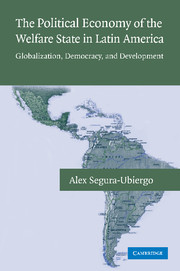 The Political Economy of the Welfare State in Latin America
The Political Economy of the Welfare State in Latin America Book contents
- Frontmatter
- Contents
- Tables and Figures
- Acknowledgments
- 1 Introduction
- 2 The Historical Evolution of Welfare Systems in Latin America: Qualitative Comparative Analysis
- 3 Theoretical Framework and Main Hypotheses
- 4 Determinants of Social Spending in Latin America: A Time-Series Cross-Section Analysis, 1973–2003
- 5 Chile: A Classic Latin American Welfare State under Authoritarian Stress (1973–1989) and Democratic Reinvention (1990–2000)
- 6 Costa Rica: Globalization, Gradual Reform, and the Politics of Compensation, 1973–2002
- 7 Peru: Political Instability, Regime Change, and Late Economic Reform in a Non-Welfare State, 1973–2000
- 8 Conclusion: Summary and Final Reflections on the Sustainability and Effectiveness of Latin American Welfare Systems
- Bibliography
- Index
4 - Determinants of Social Spending in Latin America: A Time-Series Cross-Section Analysis, 1973–2003
Published online by Cambridge University Press: 10 July 2009
- Frontmatter
- Contents
- Tables and Figures
- Acknowledgments
- 1 Introduction
- 2 The Historical Evolution of Welfare Systems in Latin America: Qualitative Comparative Analysis
- 3 Theoretical Framework and Main Hypotheses
- 4 Determinants of Social Spending in Latin America: A Time-Series Cross-Section Analysis, 1973–2003
- 5 Chile: A Classic Latin American Welfare State under Authoritarian Stress (1973–1989) and Democratic Reinvention (1990–2000)
- 6 Costa Rica: Globalization, Gradual Reform, and the Politics of Compensation, 1973–2002
- 7 Peru: Political Instability, Regime Change, and Late Economic Reform in a Non-Welfare State, 1973–2000
- 8 Conclusion: Summary and Final Reflections on the Sustainability and Effectiveness of Latin American Welfare Systems
- Bibliography
- Index
Summary
This chapter uses time-series cross-section data to analyze the economic and political determinants of social spending in Latin America over the last three decades (1973–2003). The chapter is divided into four sections. The first section describes data sources and research design; the second section defines the dependent and independent variables; the third section is a general discussion of pooled time-series techniques and presents the econometric model; and the fourth section discusses the main results of the empirical analysis using, first, aggregate social spending as the dependent variable, and then disaggregating the results into social security and human capital expenditures (health and education). The chapter also includes two appendices. Appendix 4.1 is a summary of the main variables and data sources; Appendix 4.2 describes the Error Correction Model (ECM) – the statistical model used in the regression analysis of this chapter.
Data Sources, Research Design, and Model Specification
The analysis is based on a data set including fourteen Latin American countries during the 1973–2003 period. The full data matrix, therefore, comprises 14 countries × 31 years (hence, the maximum number of observations is 434). The use of lagged variables and some missing data actually led to the analysis of panels of different sizes. This depended on the country and year coverage of the relevant variables.
- Type
- Chapter
- Information
- The Political Economy of the Welfare State in Latin AmericaGlobalization, Democracy, and Development, pp. 127 - 173Publisher: Cambridge University PressPrint publication year: 2007


